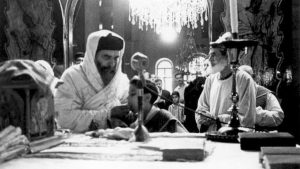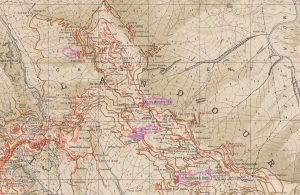The Introduction (ix-xv) and The Shift (3-15) will make their way into the required reading list for countless courses around the world dealing with issues of spirituality and leadership. They are that good. The final chapter – The Big Me (241-270), with its ‘The Humility Code’ – will not be too far behind. Brooks takes just 50 pages to nail his argument.
In the other five-sixths he collects eight ‘biographical essays’ because ‘moral improvement occurs most reliably when the heart is warmed’ (xiii). These people discovered their lives were made of ‘crooked timber’ (Kant) – and so they ‘waged war’ with it. Frances Perkins, Ike Eisenhower, Dorothy Day, George Marshall, A. Philip Randolph, Mary Anne Evans (George Eliot), Augustine, and Samuel Johnson. As we meander through the stories, Brooks urges us to ‘relearn a vocabulary of character’ (15) that has been lost.
Brooks’ argument builds on a distinction made by Rabbi Soloveitchik regarding the two sides of our nature, Adam I and Adam II. Brooks has a gift in drawing contrasts in a succinct manner. Adam I is interested in CV, or resume, virtues. Adam II is committed to eulogy virtues. Adam I is about what we say as we market ourselves for success, while Adam II is what people say at our funeral about our character.
Narcissism is the cultural setting in which the confrontation between these two Adams takes place. It is a ‘gospel of self-trust’ (7). ‘You are special. Be true to yourself. Follow your passion. Don’t accept limits…’ For Brooks, ‘a moral tradition has been left behind’ (15), as people have become self-absorbed – or, in the words of George Eliot – we are ‘taking the world as an udder to feed our supreme selves’ (244).
This infects Christian communities. One of my own long-standing concerns is that so much teaching on topics like spiritual gifts and self-esteem owe more to the spirit of the age than to the Spirit of God. The very notion that our gifts and our strengths should determine our vocation beggars belief. Where and when will we then confront our weaknesses and our flaws? Vocation is determined by calling primarily, not gifting (which comes soon afterwards). Brooks’ message is that we need ‘to become strong in the weak places’ (10) so that ‘Adam I bows down to Adam II’.
Woven into the ‘biographical essays’ is all kinds of wisdom: the nature of sin (54-55); the value of suffering (93-96); a beautiful paragraph on what ‘sensitive people do when other people are in trauma’ (100-101 – it reminded me of my godly mother!); the nature of love (168-174); the nature of pride (198-201); a reflection on status updates on facebook (250-251); and on parenting (254-257). But the common denominator with the eight stories is clear and bold:
… each of the lives started with a deep vulnerability and undertook a lifelong effort to transcend that vulnerability … And yet each person was redeemed by their weakness. Each person struggled against that weakness and used that problem to grow a beautiful strength. Each person traveled down into the valley of humility in order to ascend to the heights of tranquility and self-respect (268).
It is easy to overhear the wisdom and character of Jesus in these pages. I longed for references on the way the Holy Spirit provides the energising power to produce this kind of character – but not sure it would have worked. The way Brooks packages biblical wisdom for a readership that is increasingly skeptical about us, the people of the Book, is one of the attractions of his writing.
Speaking of people of the Book, this is the same David Brooks who wrote the heralded article on John Stott in his New York Times column, all those years ago. I do not know all the details, but that encounter with Stott greatly impacted Brooks’ own spiritual journey. In a book that finds its way to an advocacy of humility as ‘the greatest of all virtues’ – it is humility that both Brooks and Stott have in common. I valued Brooks’ vulnerability. ‘This book is about Adam II … I wrote it to save my own soul’ (xi). The final paragraph – in the Acknowledgements (!) at the very end – took me by surprise and made me a little weepy (which is not particularly difficult to do), with all that is left unsaid.
Life has its vicissitudes and unexpected turns. My ex-wife, Sarah, has done and continues to do an amazing job raising our three children. Those children, Joshua, Naomi, and Aaron, are now spread around the globe, and exemplify the traits of character that any parent dreams of: courage, creativity, honesty, fortitude, and loving kindness. They don’t really need this book, but I hope they profit from it. (273)
My own battle with these issues of the self and its place and profile in my life took a sweeping turn all those decades ago when I read ‘Self-Understanding and Self-Giving’ in Stott’s The Cross of Christ. Have you read these pages? The words melted me and electrified me – as they do so again just now. They became a starting point. Self-denial and self-affirmation. Dignity and depravity. Worth and unworthiness.
On the one hand, the cross is the God-given measure of the value of our true self, since Christ loved us and died for us. On the other hand, it is the God-given model for the denial of our false self, since we are to nail it to the cross and put it to death. Or, more simply, standing before the cross we see simultaneously our worth and our unworthiness, since we perceive both the greatness of his love in dying, and the greatness of our sin in causing him to die (285).
nice chatting
Paul
[PS: I see from the ‘labels’ section to the right that this is my 100th book review :)].
About Me

the art of unpacking
After a childhood in India, a theological training in the USA and a pastoral ministry in Southland (New Zealand), I spent twenty years in theological education in New Zealand — first at Laidlaw College and then at Carey Baptist College, where I served as principal. In 2009 I began working with Langham Partnership and since 2013 I have been the Programme Director (Langham Preaching). Through it all I've cherished the experience of the 'gracious hand of God upon me' and I've relished the opportunity to 'unpack', or exegete, all that I encounter in my walk through life with Jesus.
2 Comments
Leave a Comment
Recent Posts
Football helps me train preachers. See, when you speak to me about football—or, ‘footie’—I need to know where your feet are before I can understand what you mean. Are your feet in Ireland, or Brazil, or the USA, or NZ—or in crazy Australia? It must be the most fanatical sporting nation in the world. Within…
Having been born in 1959, I don’t remember much about the 1960s. But I have heard a lot. Hippies. Drugs. Rock ‘n Roll. Assassinations. Moon-walking. A quick trip across to ChatGPT informs me immediately that it was ‘a transformative decade across the world’—marked by the civil rights and feminist movements, Cold War tensions, consumerism and…










Thank you, Paul. I always enjoy your reviews, and especially now that I am in a season of much less reading. Thanks for reading more than I can just now!
That's great. I am so pleased. After writing to keep my own mind and heart fresh and active, my primary purpose to keep going with the blog is to provide resources for others. Every blessing with all those other things and all those transitions coming up.